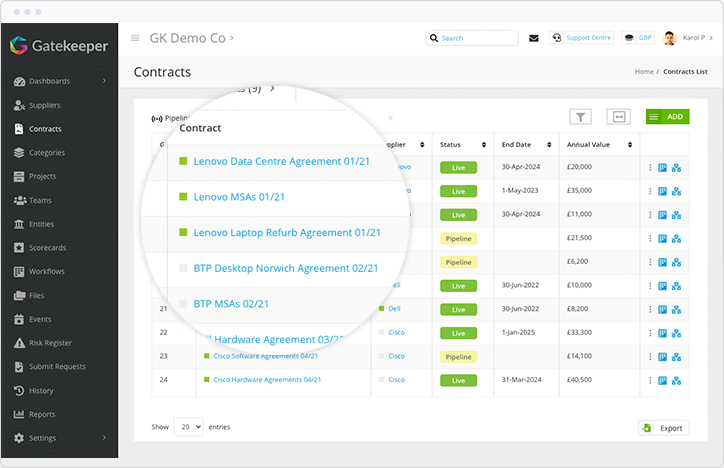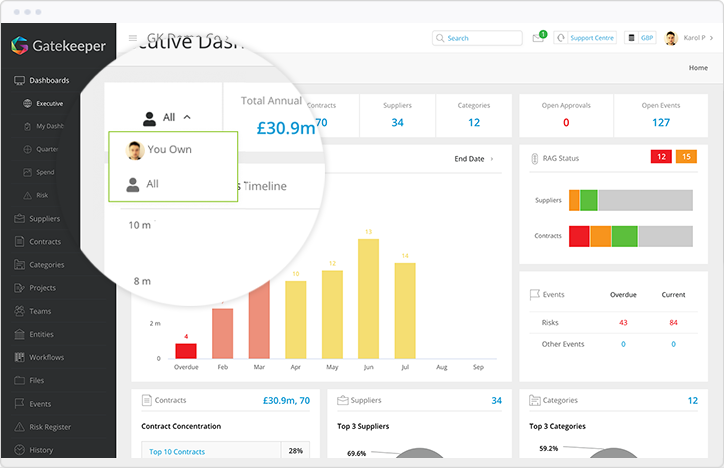Effective contract management is built on a foundation of total visibility, ownership and collaboration. Depending on the CLM Maturity of your business, you may need to implement some contract management strategies to help you build this foundation or to finesse the processes you already have in place.
When your business follows contract management best practices, it can achieve:
- A deep understanding of its contract portfolio including key dates that require actions, any potential risks and its overall level of performance
- Better contract outcomes as a result of cross-departmental collaboration
- Improved operational effectiveness as the business optimises its contracting processes
Below, we take a look at how your business can achieve world-class contract management by creating an effective plan and implementing three business-critical strategies. For a more in-depth view of each one, you can read the articles below.
- Contract Management Strategy Series: Creating A Single Source Of Truth
- Contract Management Strategy Series: Driving accountability for contract outcomes
- Contract Management Strategies: The importance of policies, processes and people
Why you need a contract management plan
Contract management involves a wide range of activities throughout the lifetime of a contract. These activities are scheduled and completed with the intention that each will help the contract to progress so the business can achieve the expected outcomes.
Creating a contract management plan raises awareness of the activities that need to be completed throughout each contract’s lifecycle, while keeping teams across the business aligned.
The consequences of having poor contract management strategies - or no strategy in place at all - include increased contract risk, auto-renewals and teams that lack oversight of what is currently happening with an agreement.
It will also inform the specific contract management strategies you implement across the business. The plan should be comprehensive and cover areas such as:
- Calendar management planning: being aware of key dates such as start dates, notice periods and end dates, assigning them and ensuring the activities can be achieved within the required time.
- Performance management: regular reviews of how a contract is performing and whether the agreed outcomes will be achieved to a satisfactory standard
- Business continuity planning: knowing how the business will respond to a variety of situations and how these events will impact overall operations
- Dispute management: how the business will identify any risks, drive corrective action, escalate if required and resolve disputes
These are just a few of the activities that should be included in your plan. Each contract, depending on its complexity, may have its own additional requirements.
Ultimately, your plan should give those involved in managing contracts a schedule of tasks that helps each agreement run smoothly through its lifecycle. This prevents the development of fragmented processes, reactive decision-making and business-critical tasks being missed.
A thorough plan should lie at the heart of your contact management strategies, as it delivers the simplicity of who should be doing what and when."
Three Contract Management Strategies you should implement right now
Effective contract management means joining the dots between your contract portfolio, your internal processes and the way your people work together. There are three core strategic pillars that your business should implement, with each requiring its own set of activities that should already be included in your contract management plan. Let’s take a quick look.
1. Create a single source of truth
Of all contract management enablers, creating a single source of truth should be your priority. By doing so, you give your business the visibility and searchability it needs to manage its portfolio. With a single source of truth, your business can have confidence in the accuracy of its contract metadata, supporting documents and other information.
To implement this strategy successfully, your business needs to:
- Create a contract documents repository
- Categorise contracts to make them easier to find
- Standardise contract document naming conventions
- Accurately capture contract data
- Set appropriate permissions for those accessing contract information
By completing each of these steps, your business will be able to identify and resolve bottlenecks, save hours of administration that would have been spent searching for contracts, protect data security and make informed business decisions in regards to its portfolio.
 Store your information in a centralised contract repository.
Store your information in a centralised contract repository.
2. Drive accountability for contract outcomes
It can be tempting to take a ‘set it and forget it’ approach to your contracts, but this approach will see your business fail to achieve the agreed outcomes. If your processes are already fragmented, your business could inadvertently increase contract risk and leave itself exposed to financial, regulatory and reputational consequences.
Contract management strategies designed to drive accountability for contract outcomes should include the following steps:
- Assign contract ownership
- Create a contracts events calendar
- Act ahead of time with templates and clause libraries
By assigning ownership, providing a schedule for all date-driven events and the tools required for effective contract management, teams can take a proactive approach to activities and be held accountable for the delivery of contract outcomes.
Whether a contract needs to be reviewed, renegotiated or renewed, there are clear dates by which the person assigned responsibilities needs to act. This prompts them to stay one step ahead and in the best position to improve contract outcomes.
 Easily identify the contracts you own and prioritise early action.
Easily identify the contracts you own and prioritise early action.
3. Align your policies, processes and people
Contract management strategies should enhance collaboration between your entire organisation. Maximum value can only be gained from your agreements when teams including Legal and Procurement teams work seamlessly together and engage meaningfully with stakeholders.
Within this contract management strategy, there are a number of steps your business should take to get everyone on the same page and ensure your contracting processes are working for involved teams as well as the business as a whole. To align the business, you should:
- Define policies and achieve buy-in
- Prioritise key contracts
- Identify opportunities for internal process optimisation
- Acknowledge team contribution
When everyone knows what goals they should be working towards, which contracts they should be prioritising and how they can improve the current way of working, your business’s contract management processes will benefit from simplicity.
The benefits of Contract Management Software
Contract management is most effective when processes are automated and standardised across the organisation.
Visibility is gained from a contract repository, collaboration is seamless when everyone works in the same way and accountability for outcomes can be driven when there is a clear record and a system that prompts action.
A contract management plan will highlight current weaknesses, strategies will strengthen them and contract management software will help you to optimise internal processes."
Gatekeeper is a contract management software for your entire organisation.
With unlimited users on all plans, cross-departmental collaboration is enhanced - allowing all teams to work together to embed successful contract management strategies into the business. It can also support the strategies outlined above with:
A cloud-based contract repository
CLM solutions centralise all of your contracts, metadata and related documentation into a centralised repository. Not only will this centralisation increase visibility, but it also creates a single source of truth allowing all teams to work from complete and accurate records.
Huge amounts of time can be saved by your team when they know exactly where to locate agreements. They can get to work faster, make accurately informed decisions and always know they are working with the most up-to-date information available.
A cloud-based repository offers a single source of truth that can be accessed from wherever your team is. The added benefit of such a system is the security measures it involves - ensuring that only approved users and stakeholders can access specific information.
You can also set role-based permissions ensuring that only team members with the right level of seniority, for example, can make direct edits to the stored contract. These stringent measures not only stop data loss and breaches, but also mean all actions taken can be recorded.
The power of AI and automation for data input
Capturing key metadata and keeping it up-to-date is the backbone of any successful contract management strategy. Without having the right information to hand, the accuracy of decision-making needs to be called into question.
Making decisions about renewals, tracking the compliance of your third-parties and knowing how much value is really being generated by your agreements all relies on having access to accurate data.
Gatekeeper provides AI Extract technology that uses artificial intelligence to automatically extract all key metadata, dates and clauses from your agreements. It stores this information directly against the master record in the contract repository.
It saves time, eliminates the potential for human error and contributes effectively to create a single source of truth. Combined with OCR technology that allows you to search across all of your contracts for specific terms or information, your business's strategy for creating a single, accurate view of its portfolio will be a success.
Assign named contract ownership
When using manual processes, ownership is usually assigned verbally. Sometimes it can be found in a string of emails. But it doesn't hold anyone accountable for delivering expected contract outcomes or identifying new opportunities for additional value.
CLM solutions like Gatekeeper resolve this issue. Not only are contracts assigned to a named individual, but communicating with them for updates is made easy through the Messaging Centre. Every action they take is recorded in an auditable history with time and date stamps - also making it easy to see where actions have been missed.
Changing ownership can be done easily as agreements can simply be reassigned. Whether there is an internal promotion, staff turnover or the contract is simply better placed in a different team, ownership can be continuous so someone is always held responsible and the contract doesn't slip through the cracks.
A solution that works for everyone
CLM solutions need to work for the entire organisation and not just the Legal team. If you're building your contract management strategies on a LegalTech CLM solution, the stakeholders throughout your business will never be able to truly align. This will result in you revisiting your strategies - and more than likely your technology - a lot sooner than you think.
If you want to know more about how Gatekeeper can support your contract management strategies, book a demo or contact us today.

.png)
.png)
.png)
-4.png)